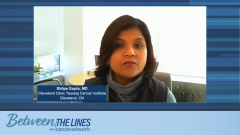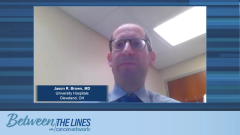
Key Takeaways and Impact on Maintenance Therapy Use in Clinical Practice
Drs. Brown and Gupta discuss key takeaways from the study and the impact these data are likely to have on clinical practice.
Episodes in this series

Jason R. Brown, MD: I can start by discussing some of my takeaways for this paper. First off is just getting an understanding of what is the goal of maintenance treatment. And to me it’s really to provide a durable response for patients. Chemotherapy often doesn’t have long-lasting response. On the other hand, immune checkpoint inhibition only works for a minority of patients in a number of cancers, for example urothelial cancer. So, if there’s a way where we can enhance the response of immune checkpoint inhibition and lengthen the duration of response, that could be an amazing thing for our patients ultimately.
Shilpa Gupta, MD: Jason, that’s a great point and I think I would like to add that we should also be looking at the duration of maintenance, right? Some of these patients are doing so well and looking at financial toxicity of the immunotherapy agents. Perhaps it would be reasonable to define a finite duration of treatment as opposed to continuing the lifelong and identify those patients who may not need that long-term treatment.
Jason R. Brown, MD: Yeah, that’s a great point and especially because these immune checkpoint inhibitors have such durable responses, the question is what’s going to be the right length, six months, one year, two years, keeping in mind that the longer patients are treated, the more they’re exposed to this agent and have potential toxicities, including financial toxicity, as you mentioned earlier.
Another point that this paper makes is the rationale for using this maintenance treatment. There’s a good biological basis behind doing this, as there’s really, at least that we see in the lab, a synergy between chemotherapy and immune checkpoint inhibitors, whether it’s exposing neoantigens to make immune checkpoint inhibition more effective, recruiting lymphocytes to make immune checkpoint inhibition, or even depleting some immunosuppressive cell types of T-reg cells.
Shilpa Gupta, MD: That’s a great point, Jason.
Jason R. Brown, MD: The next question is what we can learn from this paper that may impact our practice in terms of maintenance strategies and whether this makes us more likely to use maintenance. Both of us treat bladder cancer, and, at this point, switch maintenance for first-line metastatic cancer is essentially standard of care with maintenance avelumab following treatment. I think the point that Shilpa brought up earlier about the length of maintenance is a great one. Recently, in terms of adjuvant treatment for bladder cancer, there’s a paper showing benefit of nivolumab but that has not as of yet been as widely accepted as maintenance avelumab. I think for me it’s something that I feel can provide great benefit for my patients, especially avoiding potentially stronger treatments, but we don’t have overall survival data yet that’s mature.
Shilpa Gupta, MD: Yeah, I think that’s a great point, Jason. Going by this paper, putting out the data from, the question about whether or not we are likely to use maintenance, for us genitourinary oncologists, we want to look at, in our disease subgroup, is a maintenance agent well tolerated and secondly, what is the benefit we are seeing now? In the JAVELIN Bladder 100, there was a 7-month overall survival improvement which is really remarkable. But, if let’s say, across the tumor types, if the benefit was modest and the treatments are associated with a lot of toxicity, I think that will make us hesitant to use. The key here is tolerability and the benefit seen. To your point, even though a different setting in adjuvant and nivolumab is well tolerated, we have not yet seen overall survival data and that’s why it’s not that widely accepted just yet. I totally agree.
Jason R. Brown, MD: Exactly. I think it would be helpful just to see the overall survival data before saying definitively this is what should be done in this setting.
Transcript edited for clarity.
Newsletter
Stay up to date on recent advances in the multidisciplinary approach to cancer.


































